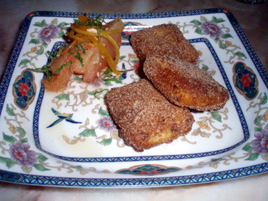
[Horine via Eater]
Note: This is a review under chef David Waltuck, who is no longer at the restaurant. His replacement is Josh Blakely. We also note that Macao now has a prominent sign—which it didn’t when this review was written.
*
Most restaurants want to be found. Macao Trading Co. takes the opposite approach. It’s on a crazily obscure block in TriBeCa, without so much as a sign to let you know it’s there. The door looks like a service entrance. Even if you’re looking for Macao Trading Co., you’re liable to miss it—as I did the first time. If you just happen to be walking by, you’ll keep on walking.
That’s not stopping people from patronizing Macao Trading Co., which was doing a brisk bar business even at 6:00 p.m. last night. They serve food and drinks until 4:00 a.m. in an allegedly “semi-private lounge” downstairs called the Opium Den. There’s a built-in clientele, thanks to the same owners’ acclaimed cocktail bar cum restaurant, Employees Only, another peculiar place that makes virtue out of the perception of inaccessibility.
The story is completely different at the perpetually-empty Dennis Foy next door, as it was at Foy’s short-lived predecessor, Lo Scalco, which not even a star from the Michelin Guide could rescue. There aren’t any “bad blocks” in Manhattan, but some are bad for certain types of restaurants. In this place, Macao Trading Co. fits right in.
The restaurant is named for Macao, a former Portuguese colony on the Chinese mainland. The décor is tricked out like the 19th-century trading warehouse of our dreams. If Disney had a Macao ride, it would look like this. The spectacular back-lit bar is the visual highlight, and it’s the culinary highlight too. The cocktail list is impressive; the food feels like snacks that are meant to dilute the alcohol.
David Waltuck of Chanterelle is responsible for the fusion menu. Many dishes are shown in pairs, where you can choose either the Portuguese or the Chinese version of the same ingredient, such as meatballs, prawns, or ribs. Each table is set with a knife and fork, and chopsticks.
There are appetizers and entrées, but the menu seems to be evolving more towards small plates and snacks. The server steered me in that direction, suggesting I order two of the small plates. That wasn’t quite enough for a meal, so I later ordered a third, followed by dessert.


Mackerel Escabeche ($8; above left) was like a deconstructed ceviche, served cold. It tasted fresh and mildly tart, but slightly bland. Portuguese lamb balls filled with cheese ($8; above right) were tender, but overpowered by a flood of tomato sauce. The identical green-flecked leaves seem to be the default seasoning for both dishes.


Mushroom croquettes ($12; above left) benefited from a generous helping of truffle oil, but I thought the barren plate needed something to dip them in. Fried milk ($7; above right) was one dish that didn’t need any more help. A dusting of cinammon and a light honey citrus salad on the side worked perfectly together.
The cocktails are impressive, though expensive at $14 apiece. I’ll leave it to the cocktail specialists to describe them. The wine list seems to be an afterthought. There was just one token red available by the glass, and they served it in a water glass.
Service was attentive, though I was there quite early and had their mostly undivided attention. I especially appreciated the server’s modest ordering advice, as restaurants that specialize in small plates usually try to sell you more than you need.
All four of the items I tried struck me as enjoyable complements to the cocktail menu, but I wouldn’t come here for the food alone.
Macao Trading Co. (311 Church Street between Walker & Lispenard Sts., TriBeCa)
Food: *
Service: *
Ambiance: *½
Overall: *
 Wednesday, April 1, 2009 at 01:34PM
Wednesday, April 1, 2009 at 01:34PM  David Waltuck,
David Waltuck,  Macao Trading Co. in
Macao Trading Co. in  BruniBetting
BruniBetting 






